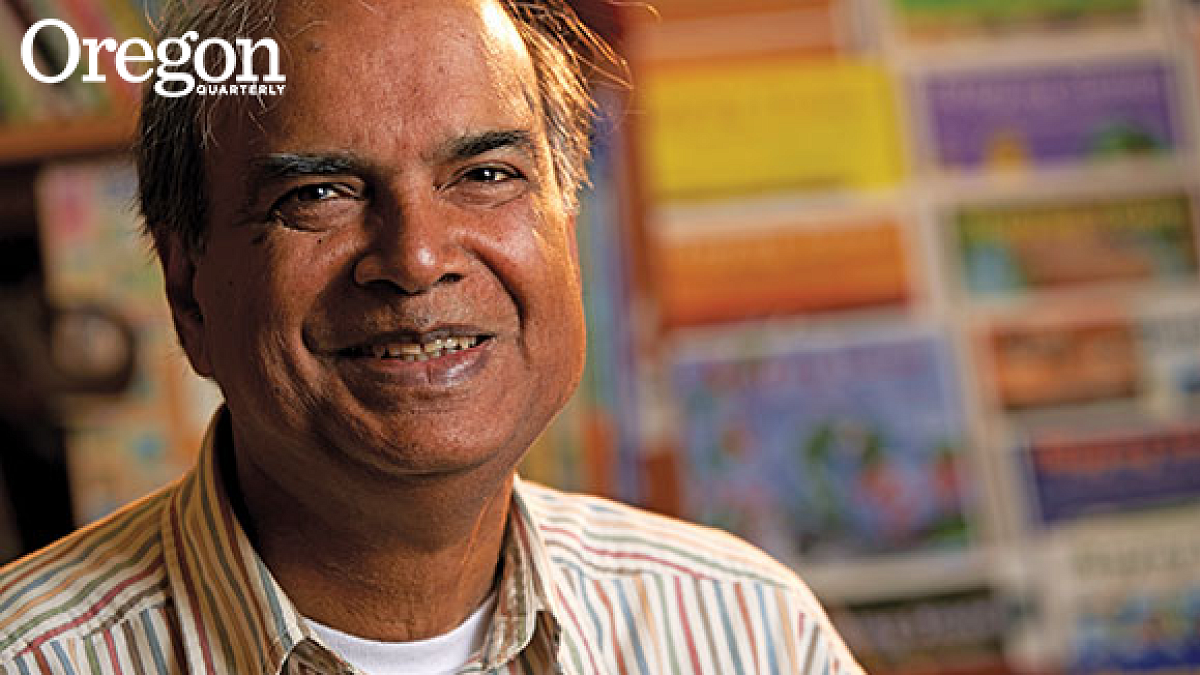When she arrived in Eugene 13 years ago, Nina Forsberg, MA ’04, MEd ’06, suffered from culture shock at finding herself back in school in the United States. She was fresh from a Fulbright in Korea and poised to complete dual master’s degrees in English and education at the UO. One of her mandatory classes, a course on diversity in education, required internship hours. Forsberg searched the Yellow Pages and discovered a Eugene-based multicultural children’s magazine, where she secured an internship that paved the way for her work as a professional editor.
Thirty years ago, Arun Narayan Toké—born and raised in India—attended the War Resisters League international conference. World peace, he decided, must begin with the education of children. He came to Cottage Grove, Oregon, to work as a publication manager at Aprovecho Sustainability Education Center in 1987 and launched Skipping Stonesmagazine—dedicated to promoting peace through children’s stories and poems about their own cultures and concerns—a year later. (In addition to publishing writing and art by children, the magazine also occasionally publishes articles by adult writers that address such topics as peacemaking, environmental issues, and multiculturalism.) Most of the magazine’s interns, translators, and editors lived in Eugene, so Toké relocated his office to an unassuming building on 12th Avenue near the UO campus.
Over the decades, dozens of students from the University of Oregon have pushed through the bright green door, and, surrounded by thousands of books and manuscripts, have helped produce a bimonthly publication of writing and artwork from kids around the world. Over an omnipresent cup of tea, Toké sits down with new interns to talk about their particular interests and experiences and how they might contribute their own writing in keeping with the magazine’s mission. “We’d tell stories and talk about travel,” Forsberg recalls, “in a comfortable office that was such a nice contrast to the hustle and bustle of university study.”
Toké speaks of past and current interns with affection, describing their work as clearly as if it’s featured in the current issue. Xiaohui Li, BA ’14, wrote about Chinese New Year traditions; Kamiiya Williams, BA ’14, wrote articles from an African American perspective about growing up on the violent streets of Chicago; Charlotte Rheingold, class of 2015, wrote about her Jewish heritage and festivals she had attended.
“I want them to write about their experience,” Toké explains, “about their cultures, their trips, their perspectives. They commit for one term and end up interning two or three terms. They must like the mission.”
Interns also help with the magazine’s layout, and review artwork and text submissions from younger contributors. Their handwritten notes in different colored ink on each manuscript give Toké a sense of which pieces will work best for an upcoming issue.
“Everyone gets to participate in the big stuff,” says Emily Carpenter, BA ’14, who interned her senior year as a journalism student. She recalls the tough decisions she made about which children’s pieces would get published and which would be returned. Now a reporter at the Argus Observer, she says her work at Skipping Stones helped teach her the importance of representing a variety of perspectives.
“We need to make sure we get the other side of the story,” she says. “I think if we were all like Arun, if we all listened the way he does, this world would have a lot fewer problems. That peace thing would happen in no time.”
Daemion Lee, BA ’08, discovered Skipping Stones after his work in the Peace Corps. “I did a lot of writing in Sierra Leone,” he says. “When I got back, I was trying to figure out my next path, and got hooked up with Arun.”
Though his official internship has ended, Lee still shows up at the office to read submissions. He admires those that delve into politics. “Kids can be really thoughtful about current events,” he says. “People sent in poems about the protests in Hong Kong and a nonfiction piece about children in Ukraine.” His two-page photo essay about his experiences in Sierra Leone appears in the January-March 2015 issue.
Interns find in Toké a validation of their own experiences and ideas. Many describe him as both mentor and friend. Charlotte Rheingold enjoyed working alongside him, taking a break to share his curry and vegetables and her baked goods.
“I came to Eugene from Tucson,” she says, “and here was this older, caring, nurturing person. I loved sitting with him—he showed me how to have friends of a different age and background.”
Rheingold wrote a piece for Skipping Stones about her relationship to the Sonoran desert. She’s now editor of the Oregon Undergraduate Research Journal and is interested in making a career in magazine publishing and editing.
Many former interns at Skipping Stones go on to journalistic careers. Lee interns at Eugene Weekly. Nina Strochlic, BA ’13, works as a reporter for the Daily Beast. Nina Forsberg taught for the International High School at South Eugene High School before working as a professional editor—a job she balances with caring for her two young children.
“I’m just waiting for my older daughter to turn five,” Forsberg says, “and then I’ll encourage her to submit her writing to Skipping Stones.”
—By Melissa Hart
Melissa Hart is an adjunct instructor in the University of Oregon School of Journalism and Communication and the author of Wild Within: How Rescuing Owls Inspired a Family (Lyons, 2014).


